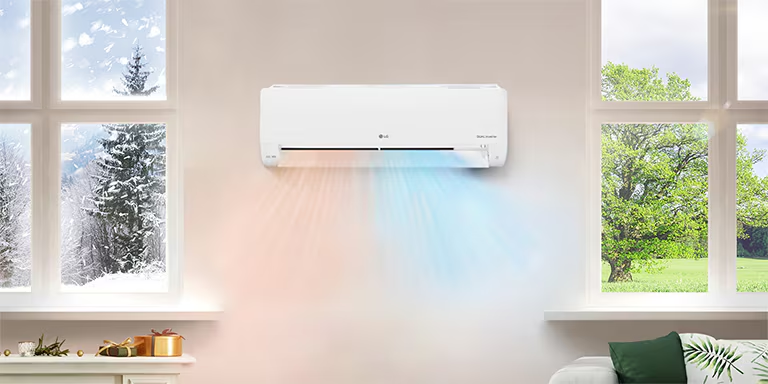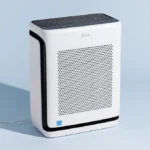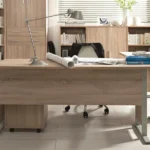An air conditioner (AC) is more than just a luxury in many parts of the world—it’s a necessity. It keeps your home comfortable during the hot summer months by cooling the air and, in some cases, improving indoor air quality. With advancements in technology, today’s air conditioners are more energy-efficient, powerful, and versatile than ever before. In this article, we’ll explore how air conditioners work, the different types available, and how to choose the right one for your home.
Click here to get the best deal on Air Conditioners
1. How Air Conditioners Work
At its core, an air conditioner works by removing heat from the indoor air and releasing it outside, leaving cooler air inside your home. Here’s a simplified breakdown of the process:
- Refrigerant: The AC unit uses a refrigerant, a chemical that can easily convert from a gas to a liquid and vice versa. It absorbs heat from indoor air and releases it outside.
- Compressor: The refrigerant is pumped through the system by the compressor, which increases the refrigerant’s temperature and pressure as it moves through the unit.
- Condenser: The refrigerant passes through a condenser coil, where it releases the absorbed heat outside the house.
- Evaporator Coil: Inside the home, the refrigerant moves through the evaporator coil, where it absorbs heat from indoor air, cooling it before circulating it back into the room.
- Fans: The air conditioner’s fans help move air through the system, ensuring that cool air is efficiently distributed throughout the home.
2. Types of Air Conditioners
There are several types of air conditioners available, each designed to suit different needs and spaces. Choosing the right type depends on factors like room size, energy efficiency, and installation requirements.
a. Central Air Conditioners
Central air conditioning is the most common and effective way to cool an entire house. It uses a system of ducts to distribute cooled air throughout the home.
- Pros: Consistent cooling, ideal for large homes, improves air quality, and can be combined with heating systems.
- Cons: Expensive to install, requires ductwork, higher energy consumption if the home is not well-insulated.
b. Window Air Conditioners
Window air conditioners are a popular and affordable option for cooling single rooms. They are installed in a window or a specially made opening in the wall.
- Pros: Inexpensive, easy to install, great for small spaces.
- Cons: Only cools one room, may obstruct the view or light from the window, can be noisy.
c. Portable Air Conditioners
Portable air conditioners are standalone units that can be moved from room to room. They vent hot air through a window or sliding door.
- Pros: Flexible, easy to move, no permanent installation required.
- Cons: Less efficient than other types, limited cooling capacity, requires venting through a window or exhaust hose.
d. Ductless Mini-Split Air Conditioners
Ductless mini-split systems are a popular choice for homes without ductwork. These units consist of an outdoor compressor and one or more indoor air handlers mounted on the wall.
Click here to get the best deal on Air Conditioners
- Pros: Efficient, quiet, can cool individual rooms, no ductwork needed.
- Cons: Higher upfront cost, requires professional installation.
e. Hybrid Air Conditioners
Hybrid air conditioners alternate between using electricity and other fuel sources, such as natural gas, to power the system. These units optimize energy usage by switching between different modes depending on the temperature.
- Pros: Energy-efficient, reduces energy bills, environmentally friendly.
- Cons: High installation cost, complex to maintain.
f. Geothermal Air Conditioners
Geothermal systems use the Earth’s stable underground temperature to cool (or heat) your home. These systems are environmentally friendly and can be very efficient.
- Pros: Highly energy-efficient, low operating costs, environmentally friendly.
- Cons: Very expensive to install, requires a lot of land for installation.
3. Energy Efficiency and Air Conditioners
With rising energy costs and growing concerns about environmental impact, energy efficiency is a key factor when choosing an air conditioner. The energy efficiency of an AC unit is measured using two main ratings:
- SEER (Seasonal Energy Efficiency Ratio): This rating measures the efficiency of central air conditioners. A higher SEER rating means better energy efficiency. Most modern units have SEER ratings between 13 and 21.
- EER (Energy Efficiency Ratio): EER measures how efficiently an air conditioner operates at a specific temperature (usually 95°F). A higher EER indicates more efficient operation.
4. Choosing the Right Air Conditioner for Your Home
When selecting an air conditioner, there are several factors to consider beyond just cooling capacity. Here are some tips to help you make the right decision:
a. Size and Room Area
The size of the air conditioner should match the size of the room or area you want to cool. An air conditioner that’s too small will struggle to cool the space, while one that’s too large will cool the room too quickly without removing humidity, leaving the space feeling damp and clammy. To determine the right size, measure the square footage of the room and consult a BTU (British Thermal Unit) sizing chart.
b. Energy Efficiency
Look for air conditioners with high SEER and EER ratings to save on energy costs. Many units also come with Energy Star certification, which indicates that they meet or exceed energy-efficiency guidelines.
c. Noise Level
If you’re sensitive to noise, choose a unit that operates quietly. Window and portable air conditioners tend to be louder than central or ductless systems, so consider this when selecting a model for a bedroom or quiet space.
d. Installation and Maintenance
Consider the installation requirements and long-term maintenance needs of the unit. Central and ductless systems require professional installation, while window and portable units can be installed by most homeowners. Ensure that you can easily access and clean or replace filters, as regular maintenance is key to the efficiency and longevity of your air conditioner.
e. Smart Features
Many modern air conditioners come with smart features, such as Wi-Fi connectivity, mobile app controls, and programmable thermostats. These features allow you to adjust the temperature, set schedules, and monitor energy usage remotely, providing greater control and convenience.
Click here to get the best deal on Air Conditioners
5. Maintaining Your Air Conditioner
Regular maintenance is essential for keeping your air conditioner running efficiently. Here are some tips to ensure your unit operates smoothly:
- Change or Clean Filters: Dirty filters can reduce airflow and strain the system, leading to inefficiency and higher energy costs. Check and replace or clean filters every one to three months, depending on usage.
- Clean Coils: The evaporator and condenser coils collect dirt over time, reducing their efficiency. Clean them at least once a year to maintain optimal performance.
- Check the Thermostat: Ensure that the thermostat is working correctly. Consider upgrading to a programmable or smart thermostat to improve energy efficiency.
- Schedule Professional Maintenance: For central or ductless systems, schedule annual professional maintenance to inspect refrigerant levels, check for leaks, and ensure that all components are in good working order.
6. Environmental Impact and Eco-Friendly Options
Air conditioners, especially older models, can consume a significant amount of energy and contribute to greenhouse gas emissions. However, newer units are designed to be more energy-efficient, reducing their environmental impact. Additionally, refrigerants like R-410A, which are used in many modern units, have a lower global warming potential (GWP) than older refrigerants like R-22 (Freon).
To minimize your air conditioner’s environmental impact:
- Choose an energy-efficient model with a high SEER or EER rating.
- Use smart thermostats to minimize energy usage when the AC is not needed.
- Keep your home insulated to reduce the amount of cooling required.
Conclusion
Air conditioners play a vital role in maintaining comfort, particularly in hot climates. With various types and features available, there’s an air conditioner suited for every home and lifestyle. By considering factors such as size, energy efficiency, and installation, you can choose the right unit to meet your needs while minimizing energy consumption.
Investing in a well-maintained, energy-efficient air conditioner will not only keep your home cool but also improve indoor air quality and reduce your environmental footprint.



